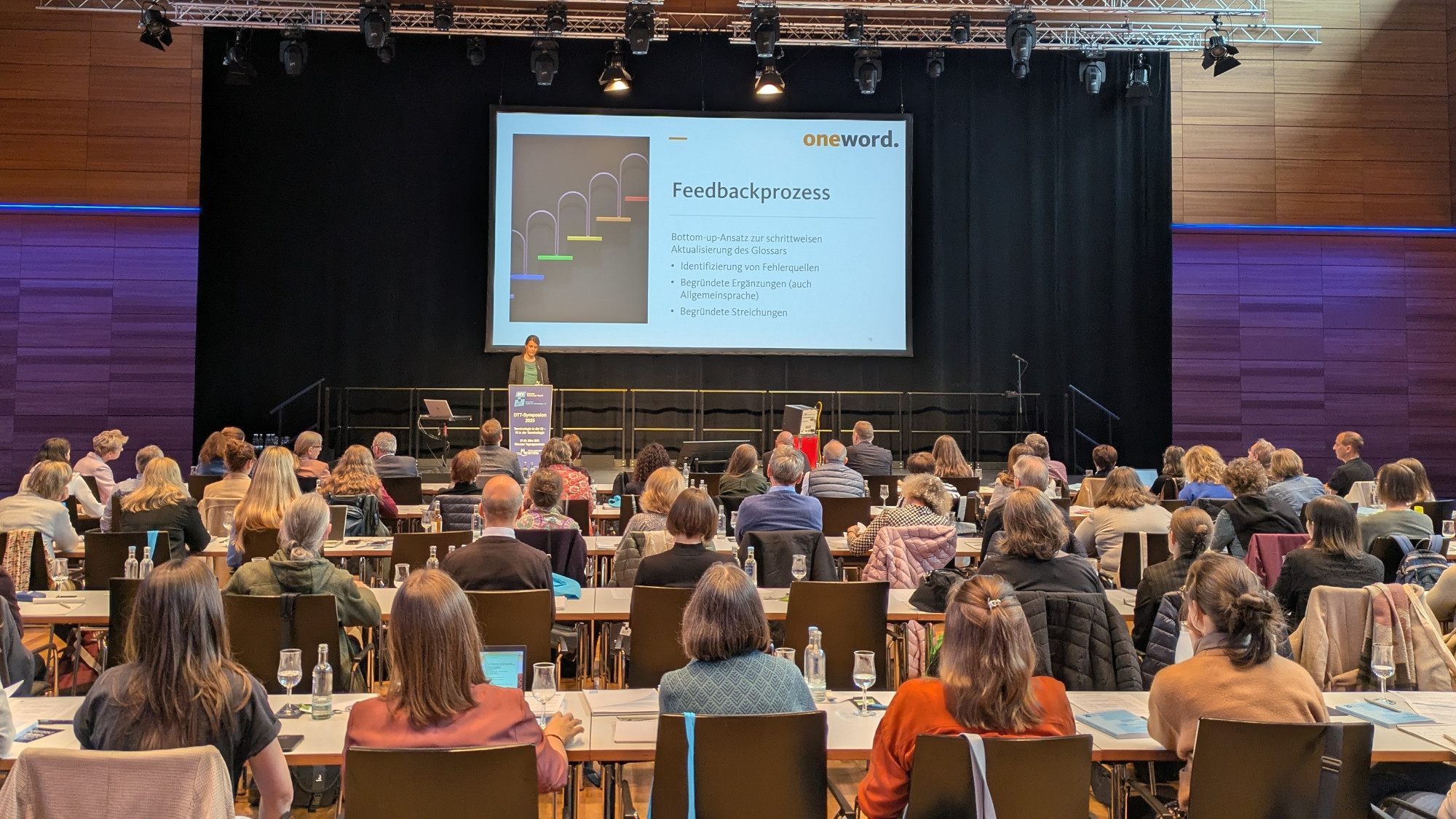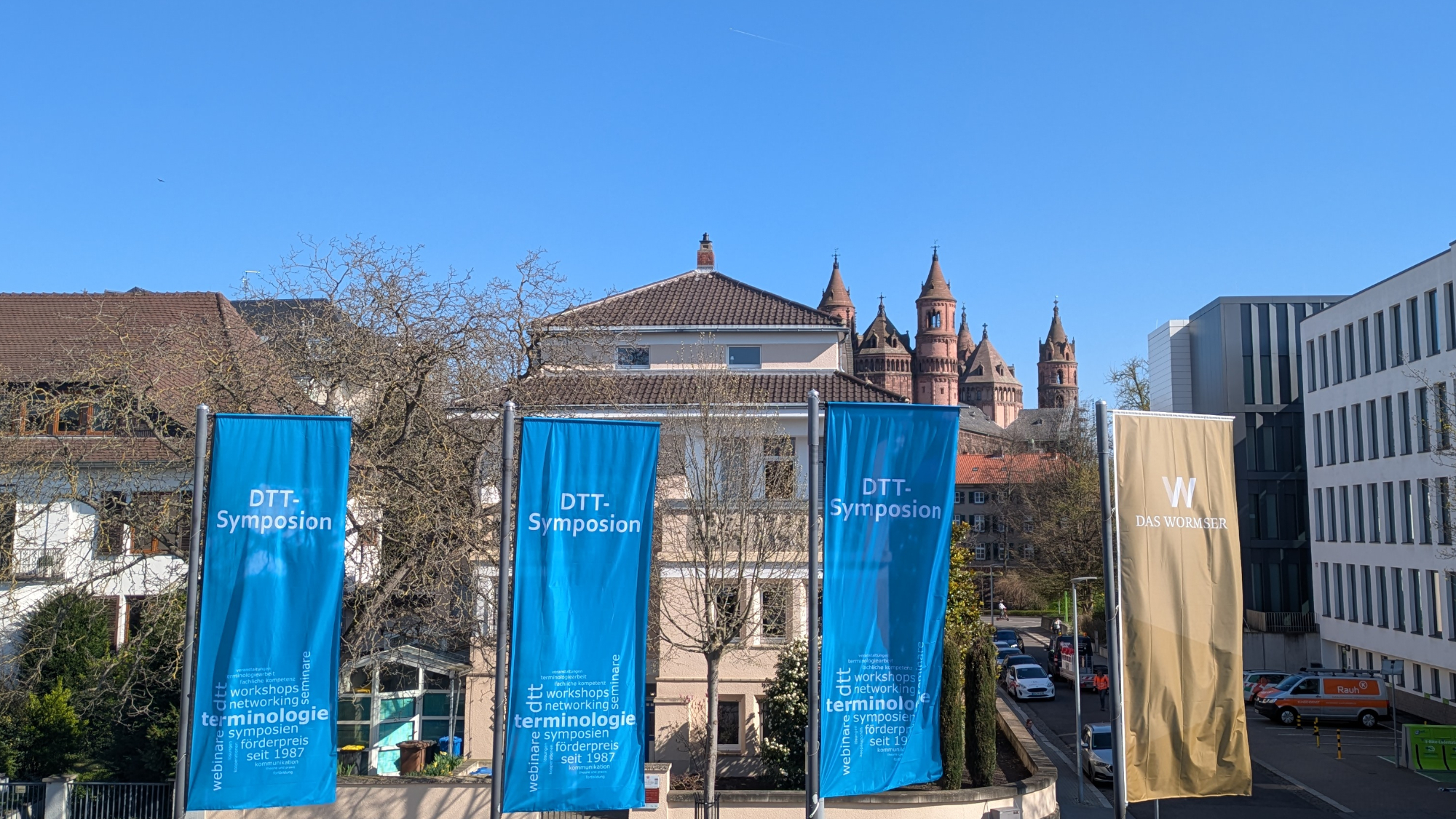22/04/2025
Terminology and AI – a look back at the DTT Symposium 2025
Every two years, the German Terminology Association (DTT) organises a two-and-a-half-day symposium to highlight developments, research and trends in the terminology sector. This year the conference was held for the first time in Worms, where the terminology community came together from 27 to 29 March. The conference’s tagline was ‘Terminology in AI – AI in terminology’. As a DTT member, oneword has been taking part in the symposium for many years. This year, our Head of Terminology Management and MTPE Jasmin Nesbigall was invited to speak for the second time to familiarise participants with creating glossaries for MT and AI. We look back on a successful symposium with many exciting ideas and the ‘human at the core’.
Getting ready for the infocalypse
The event was kicked off by Prof Dr Ziad Mahayni, Professor of Applied Ethics at Karlsruhe University of Applied Sciences, whose keynote speech explored how artificial intelligence influences our information ecosystem. The core of his talk was the idea that disinformation can bring about an infocalypse and a reflection on how a society changes if every piece of information conveyed by the media could potentially be false. Obvious deepfakes shown in the lecture, such as a muscle-bound Olaf Scholz in a bodybuilder pose, earned many laughs from the audience. However, this turned into astonishment when he showed a video call with five participants: four out of five of the people were image and voice clones and the only real person on the call didn’t realise. The speaker aptly commented on this by saying, “I can now see a lot of awkward expressions, but my briefing for the keynote speech didn’t say that I had to spread good humour.”
A successful mix of specialist presentations
This was followed by numerous specialist presentations from industrial companies, service providers, tool manufacturers and universities on a wide range of topics relating to AI and terminology. The interplay of these main topics was considered in different contexts, for example in knowledge and quality management, in machine translation, and also in training and teaching.
The speakers from Busch Vacuum Solutions, for example, showed how AI was used to bring together terminology databases from merged companies. This involved comparing thousands of entries and terms and defining how they are used. This is because a particular strength of LLMs – in this particular case, a company’s own LLM solution – lies in analysing, comparing and merging language data. This means that even huge databases can be processed within a short space of time and the results organised in a such a way as to enable a very targeted and efficient check by a human reviewer.
After lunch, our Head of Terminology Management and MTPE Jasmin Nesbigall brought the participants out of their midday slump. Using an apt food analogy, she showed what ingredients and equipment glossaries require, what needs to be considered when ‘preparing’ them and why the saying ‘the more, the better’ is just as inappropriate for compiling a glossary as it is in the kitchen. With many examples and concrete solutions, she used her practical presentation to make the process of creating glossaries for MT and AI accessible to everyone.
Jasmin Nesbigall giving a presentation on creating glossaries (source: DTT e. V.)
Terminology speed dating
Of course, a face-to-face event does not thrive on expertise alone. It is also about networking and exchanging ideas with others. During the breaks, people took advantage of the opportunity to chat in ever-changing groups on the sunny roof terrace of the conference centre, with its view of Worms Cathedral. In the afternoon, a speed dating session livened up the programme, with different ‘couples’ meeting in three rounds to get to know each other better in just 12 minutes.
The first day was brought to an almost traditional close by improvisation musician Dad’s Phonkey, who is now considered a star of the terminology scene, this being his third symposium appearance. Even though people requested songs from the last two symposia, improvised music means that no pieces can be reproduced. This time, too, he wowed the audience with different styles and completely incoherent, random lyrics for his songs, which he was able to perform in German, English, French, Russian and Arabic.
This relaxed conclusion to the official programme was followed by the evening event, where people consolidated the contacts they had made throughout the day, discussed their impressions and ideas, and the community celebrated its reunion in a restaurant with a view of the Rhine and the Nibelungen Bridge.
DTT sponsorship prizes
In another tradition, the second day of the conference was opened by the DTT sponsorship award winner. The DTT Sponsorship Prize is awarded to individuals, organisations or companies for important contributions to terminology science or terminology work and, this year, it went to two prizewinners for the first time. Muriel Böhmicke was recognised for her master’s thesis on the integration of the SNOMED CT medical terminology database in LLMs. She showed that big large language models such as GPT perform qualitatively better than smaller ones, such as ALMA, but her examples also showed that the output of LLMs varies from case to case, even with identical input. The second sponsorship award went to Vivien Krämer and her team at Roche Diagnostics, who have developed the company’s terminology management over 13 years and expanded the department from a one-person job to a team of 13 people with a wide range of tasks relating to language management.
View from the roof terrace of the Worms conference centre (source: DTT e. V.)
Conclusion: Important insights and enriching discussions
It is definitely a challenge to choose a topic for an event and ensure that it is still just as relevant a year later when the event takes place. As everyone is still talking about AI, the choice of theme for this year’s symposium was a great success. While the keynote speech reinforced the overwhelming feeling that AI can change everything rapidly and sometimes radically, the subsequent presentations showed practical examples of using it, gave insights into future developments and emphasised the great importance of terminology. After all, terminology and clean data are more important than ever, especially for AI and LLMs. Overall, the atmosphere was consistently positive with a lot of mutual interest and an attitude that the ‘human in the loop’ approach (as it is often called) should be replaced with a ‘human at the core’ approach. And that feeling is precisely what we are taking away from this symposium. It was not just professionally enriching, but also so enjoyable on a personal level that we are already looking forward to going back in 2027.
8 good reasons to choose oneword.
Learn more about what we do and what sets us apart from traditional translation agencies.
We explain 8 good reasons and more to choose oneword for a successful partnership.


